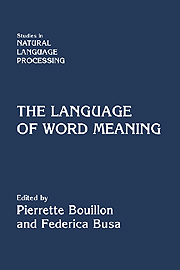Book contents
- Frontmatter
- Contents
- List of Contributors
- Preface
- Introduction: Word Meaning and Creativity
- Part I Linguistic Creativity and the Lexicon
- Part II The Syntax of Word Meaning
- Part III Interfacing the Lexicon
- Part IV Building Resources
- 18 Introduction
- 19 Generative Lexicon and the SIMPLE Model: Developing Semantic Resources for NLP
- 20 Lexicography Informs Lexical Semantics: The SIMPLE Experience
- 21 Condensed Meaning in EuroWordNet
- Index
20 - Lexicography Informs Lexical Semantics: The SIMPLE Experience
Published online by Cambridge University Press: 07 October 2011
- Frontmatter
- Contents
- List of Contributors
- Preface
- Introduction: Word Meaning and Creativity
- Part I Linguistic Creativity and the Lexicon
- Part II The Syntax of Word Meaning
- Part III Interfacing the Lexicon
- Part IV Building Resources
- 18 Introduction
- 19 Generative Lexicon and the SIMPLE Model: Developing Semantic Resources for NLP
- 20 Lexicography Informs Lexical Semantics: The SIMPLE Experience
- 21 Condensed Meaning in EuroWordNet
- Index
Summary
Abstract
Lexicography is often considered orthogonal to theoretical linguistics. In this paper, we show that this is a highly misguided view. As in other sciences, a careful and large-scale empirical investigation is a necessary step for testing, improving, and expanding a theoretical framework. We present results from the development of the Italian semantic lexicon in the framework of the SIMPLE project, which implements major aspects of Generative Lexicon theory. This paper focuses on the semantic properties of abstract nouns as they are conceptually more difficult to describe. For this reason, they are a good testbed for any semantic theory. The methodology – which has been developed to satisfy the requirements of building large lexicons – is more than a simple interface or a lexicographer auxiliary tool. Rather, it reveals how a real implementation greatly contributes to the underlying theory.
Introduction
“Unlike the mental grammar, the mental dictionary has had no cachet. It seems like nothing more than a humdrum list of words, each transcribed into the head by dullwitted rote memorization. In the preface to his Dictionary, Samuel Johnson wrote: “It is the fate of those who dwell at the lower employments of life, to be rather driven by the fear of evil, than attracted by the prospect of good; to be exposed to censure, without hope of praise; to be disgraced by miscarriage, or punished for neglect, where success would have been without applause, and diligence without reward. Among these unhappy mortals is the writer of dictionaries.” Johnson's own dictionary defines lexicographer as “a harmless drudge, that busies himself in tracing the original, and detailing the signification of words. […] we will see that the stereotype is unfair. The world of words is just as wondrous as the word of syntax, or even more so” (Pinker, 1995, 126-127).
- Type
- Chapter
- Information
- The Language of Word Meaning , pp. 350 - 362Publisher: Cambridge University PressPrint publication year: 2001

